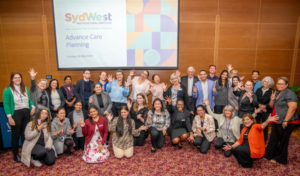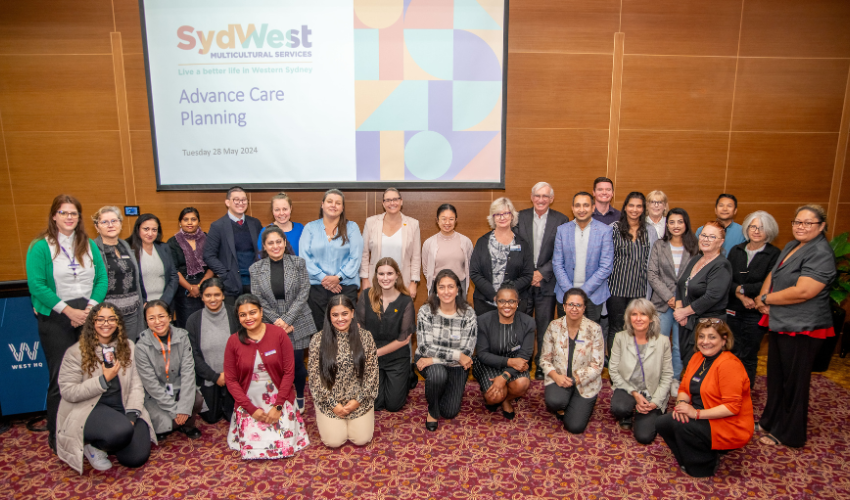On Tuesday 28th May, Palliative Care NSW participated in an Advance Care Planning event for healthcare professionals held by SydWest Multicultural Services.
It was great to hear from a variety of speakers and organisations, including Advance Care Planning Australia and End of Life Directions for Aged Care (ELDAC) and Avril Egerton, CNC, End of Life Care, Integrated & Community Health at Western Sydney LHD who provided a case study that further highlighted the importance of Advance Care Planning.
One of Avril’s insights was that there can be many nuances in different cultures and sometimes this can make clinicians fearful of approaching these discussions, but she has always found that if you just focus on ensuring the discussion is person-centred, then that immediately goes a long way to knowing and finding out these nuances. As a sector that has person-centred care at it’s heart, this consideration may make these discussions feel more approachable.
CEO Kirsty Blades was also invited to present on Palliative & End-of-Life Care, and Advance Care Planning and PCNSW was able to host a stall with a variety of useful resources for attendees. In her presentation, Kirsty reflected on the feedback she receives from Members about Advance Care Planning:
“Whenever I speak to clinicians about some of their challenges and opportunities, nearly every time, they talk to me about the opportunity to improve community education when it comes to advance care planning (82% of Australians think its important to plan and discuss, but only 14% have an Advance Care Plan). When advance care planning discussions have occurred, clinicians feel:
- That the patient and the family are less stressed as those difficult conversations have occurred;
- That the patient and family are then able to focus on that quality of life and living as well and as comfortably as they can to the very end;
- They are able to offer higher quality care that they know is meeting the needs of the patients, their family/carer;
- That family caregivers and the patient are on the same page when it comes to the care being provided, which reduces conflict;
- Their experience as a clinician caring for that patient and family is a more positive experience. This can lead to reduced stress, fatigue & burnout and improved well-being.” Kirsty shared.
Kirsty also spoke to some of the challenges when talking to CALD communities / families about Advance Care Planning including not having an interpreter readily available, the number of people who may be involved in the discussions and accessing information in other languages.
Rounding out the presentation was the sharing of a strategy that one of our Members recommended when approaching an Advance Care Planning discussion within a CALD community, which is a great approach: Work with senior leaders within the community to develop the program and assist with delivery at their pace, and deliver in a space or environment chosen by the community.
PCNSW and SydWest are hoping to work more closely together to pilot a community partnership approach to our CALD Community Conversations program. PCNSW would like to thank SydWest Multicultural Services for hosting this event, and providing a fantastic opportunity to connect with health professionals and members of the community.
If you are interested in CALD Communities and Palliative Care, make sure you join our new professional network: https://palliativecarensw.org.au/professional-networks/



